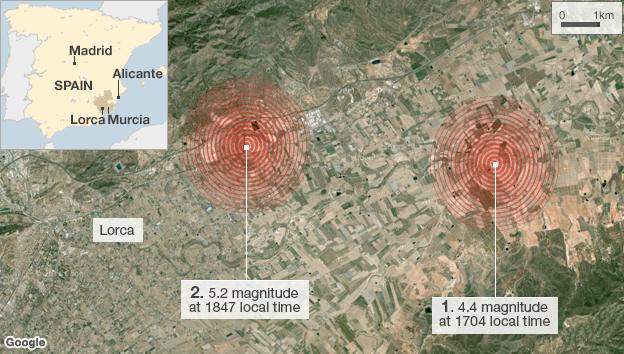Spain earthquake: Lorca residents assess damage
- Published
The quake caused widespread panic in Lorca
Residents in the Spanish town of Lorca are assessing the damage from quakes that killed nine people and forced thousands to spend the night outdoors.
The mayor of the historic town, with a population of 90,000, said: "Almost no-one slept in their homes".
Some 20,000 buildings are believed to have been damaged in what was Spain's worst earthquake for 50 years.
The magnitude 5.2 tremor hit early on Wednesday evening, around two hours after a quake measuring 4.4.
Those who died - including at least one pregnant woman and a child - were killed by falling masonry in the second tremor.
Regional officials say at least 130 people have been injured, with several in a serious condition.
'Very scared'
Lorca's Mayor Francisco Jodar said most of the town's population had spent the night sheltering in their cars, streets, public squares or other towns.
Some camped out in an outdoor basket ball court, and others used children's playgrounds.
"We have provided them with blankets, food, water and both medical and psychological attention," he said.
"It is very sad to see neighbours spending the night in the street," he added. "There is desperation and fear that there could be another seismological event."
Many people were queuing at first light for food and hot drinks from emergency workers.
Some were returning to their homes to assess the damage, although many were ordered to keep away until a safety assessment of their buildings had been carried out.
"We are very scared, because ours [house] didn't collapse, but they are very damaged," one resident, Jose Crespo, said. "All the village has fallen, everything... All the buildings have been affected."
"We know we live near a fault line but we never thought this would happen," another resident Pepe Tomas, 56, told the AFP news agency. "People are afraid. No-one here has ever seen anything like this before."
The Red Cross says it has moved in 24 ambulances and set up three field hospitals.
Hundreds of military teams are now in the town, searching the rubble for victims and survivors, beginning the clean-up and checking which buildings are safe to enter.
Schools and some roads remain closed, although some train services have now been restored, Spanish media reports.
Medieval town
The most powerful earthquake struck the town, in Murcia region, at 1847 (1647 GMT), at a depth of just 10km (six miles). The shock could be felt as far away as Madrid.
"These [tremors] were like huge pushes from below, then violent shakes left and right. It was quick, but completely terrifying," Lorca resident Angel Dominguez.
Hundreds of residents and workers streamed out of buildings and gathered in squares, parks and open spaces amid fears of further tremors.
Witnesses described seeing rubble and masonry rain down on people as they fled.
Some 350 ambulances were used to evacuate 400 patients from two hospitals in the town, regional officials said.
Lorca is an ancient town, with many medieval buildings and streets badly damaged in the quake.
A Spanish cameraman had a lucky escape after TV pictures captured the dramatic moment the bell tower from a 17th Century church crashed to the ground just metres from him.
Spain has hundreds of earthquakes every year but most of them are too small to be noticed.
Murcia is the country's most seismically active area and suffered tremors in 2005 and 1999. It is close to the large faultline beneath the Mediterranean Sea where the European and African continents meet.

- Published12 May 2011
- Published11 May 2011